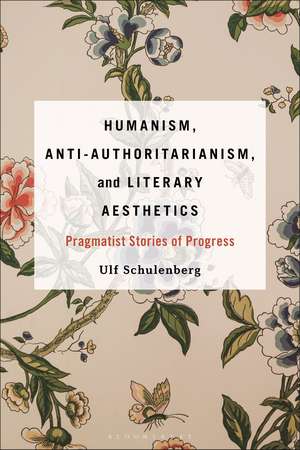Humanism, Anti-Authoritarianism, and Literary Aesthetics: Pragmatist Stories of Progress
Autor Prof. or Dr. Ulf Schulenbergen Limba Engleză Hardback – 6 sep 2023
Preț: 539.84 lei
Preț vechi: 773.71 lei
-30% Nou
Puncte Express: 810
Preț estimativ în valută:
103.30€ • 112.56$ • 87.04£
103.30€ • 112.56$ • 87.04£
Carte tipărită la comandă
Livrare economică 24 aprilie-08 mai
Preluare comenzi: 021 569.72.76
Specificații
ISBN-13: 9798765102435
Pagini: 256
Dimensiuni: 152 x 229 mm
Greutate: 0.51 kg
Editura: Bloomsbury Publishing
Colecția Bloomsbury Academic
Locul publicării:New York, United States
Pagini: 256
Dimensiuni: 152 x 229 mm
Greutate: 0.51 kg
Editura: Bloomsbury Publishing
Colecția Bloomsbury Academic
Locul publicării:New York, United States
Caracteristici
Promises an interdisciplinary study that brings together literary studies, philosophy, and intellectual history by establishing a transatlantic theoretical discourse
Notă biografică
Ulf Schulenberg is Associate Professor of American Studies at the University of Bremen, Germany, and author of Zwischen Realismus und Avantgarde: Drei Paradigmen für die Aporien des Entweder-Oder (2000), Lovers and Knowers: Moments of the American Cultural Left (2007), Romanticism and Pragmatism: Richard Rorty and the Idea of a Poeticized Culture (2015), Marxism, Pragmatism, and Postmetaphysics: From Finding to Making (2019), and Pragmatism and Poetic Agency: The Persistence of Humanism (2021).
Cuprins
Introduction 1. Humanism, Anti-Authoritarianism, and Form2. "We have no duties to anything nonhuman": Richard Rorty's Anti-Authoritarianism3. Pragmatism, Humanism, and Form4. ". and the practice has to speak for itself": Wittgenstein, Pragmatism, and Anti-Authoritarianism5. Marxism, Form, and the Negation of Aesthetic Synthesis6. "Nothing is known - only realized": Postcritique, Bruno Latour, and the Idea of a Positive Aesthetics7. "I turned to the poets": Humanist Stories of ProgressConclusionBibliographyIndex
Recenzii
In this sprawling and fascinating new book, Ulf Schulenberg argues powerfully that pragmatism, humanism, and anti-authoritarianism all hang together in a coherent, mutually reinforcing whole. The scholarship in this book is impressively wide-ranging. Drawing from a large and diverse cast of authors and thinkers, Schulenberg tells a thought-provoking story about what pragmatism is, and how it can assist in bringing about a more decent, free, and artistically rich human future.
In this provocative book, Schulenberg illuminates new entanglements between humanism, anti-authoritarianism, and pragmatism and shows why rethinking aesthetics is critical not just for the life of the arts, but for culture and practical life. He pushes back against traditional readings of Dewey (e.g. on aesthetic form) to urge pragmatist aesthetics toward more innovative approaches to contemporary art and the avant-garde. Humanism, Anti-Authoritarianism, and Literary Aesthetics will inspire fresh ways of looking at these issues and imaginative new conversations.
This is a major contribution to both pragmatist aesthetics and the understanding of what is now called neo-pragmatism. Questions of art were always at the center of pragmatism, and this wonderfully readable and carefully researched book demonstrate it beyond doubt. For Rorty, to mention one neo-pragmatist that is at the heart of this book, poetry, art, and literature are more fundamental than coping with the world, for coping is guided by how we (re)imagine the world. The Renaissance humanists taught us that we are like God in that we are also creators, but that the supreme creation is ourselves. This book is a great celebration of pragmatist humanism and aesthetics and how they instigate progress in our own self-making.
In this provocative book, Schulenberg illuminates new entanglements between humanism, anti-authoritarianism, and pragmatism and shows why rethinking aesthetics is critical not just for the life of the arts, but for culture and practical life. He pushes back against traditional readings of Dewey (e.g. on aesthetic form) to urge pragmatist aesthetics toward more innovative approaches to contemporary art and the avant-garde. Humanism, Anti-Authoritarianism, and Literary Aesthetics will inspire fresh ways of looking at these issues and imaginative new conversations.
This is a major contribution to both pragmatist aesthetics and the understanding of what is now called neo-pragmatism. Questions of art were always at the center of pragmatism, and this wonderfully readable and carefully researched book demonstrate it beyond doubt. For Rorty, to mention one neo-pragmatist that is at the heart of this book, poetry, art, and literature are more fundamental than coping with the world, for coping is guided by how we (re)imagine the world. The Renaissance humanists taught us that we are like God in that we are also creators, but that the supreme creation is ourselves. This book is a great celebration of pragmatist humanism and aesthetics and how they instigate progress in our own self-making.
